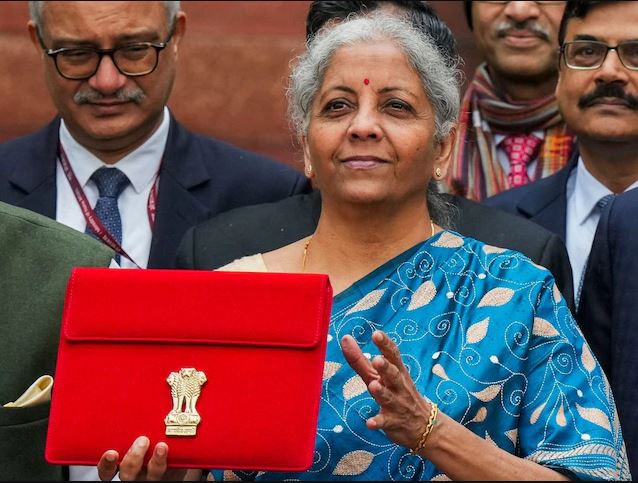The Union Budget 2024-25 presented by Finance Minister Nirmala Sitharaman has elicited various reactions from leaders across the spectrum…..

Nitya Sharma, Founder and CEO, Simpl – The Union Budget 2024 has effectively recognised the importance of a robust e-commerce ecosystem and offering credit at scale in empowering millions of small and medium sellers across the country. The proposed development of e-commerce export and industrial hubs will enable our sellers to cater to a global market while support to MSMEs and promoting entrepreneurship through policy interventions will further propel opportunities for sellers including Direct-to-Consumer brands. This along with the availability of higher disposable incomes in the hands of citizens through rationalisation of personal income taxes will propel consumer spending across the board. As a homegrown checkout network working with lakhs of sellers across the country, we are quite bullish on the growth prospects of the internet commerce sector which will generate significant demand for seamless and affordable checkout solutions.
Furthermore, the proposed development of Digital Public Infrastructure applications at scale across areas of credit and e-commerce among other areas will also drive the adoption of digital services, thereby benefiting the entire ecosystem. This, on the back of abolition of Angel tax, will greatly benefit the startup ecosystem in the country and will accelerate India’s journey towards becoming a $1 trillion digital economy well before 2027-28.

Mayank Kumar, Co-founder & MD, upGrad – “Budget 2024-25 allocations towards skilling and employment and Startup growth marks a watershed moment in India’s journey towards becoming the world’s largest talent economy.
With a very strong emphasis on skilling and employment and bridging the talent-academia gap, GOI’s allocations—to fuel aspirations of 4.1 crore youths, empower women to join the workforce, and provide tax benefits and loans like Skilling loan (upto INR 7.5 lakh) and Education loan (upto INR 10 lakh)—is a masterstroke, set to unlock India’s demographic dividend and drive growth. This budget is not just a financial plan but a blueprint for a brighter future where India’s youth will thrive and continue to lead global job requirements.
Innovative initiatives announced, such as the scheme to boost job creation in the manufacturing sector, incentives for EPFO contributions, and reimbursement for additional employee EPFO contributions, demonstrate the government’s commitment to creating a conducive employment ecosystem. India’s economic growth, described as a “shining exception,” will propel its focus on innovation and growth with a focus on job creation and skilling. The skilling loan and education loan initiatives will further empower India’s youth to drive growth and innovation.
Moreover, the government’s scheme to provide internship opportunities to 1 crore youth in 500 top companies over 5 years will bridge the industry-academia gap and enhance employability, empowering India’s youth with the opportunities they need to bridge the talent supply demand across global jobs. With such bold commitments towards jobs, skilling, and employment, Budget 2024-25 ignites a talent revolution in India, poised to propel the nation’s youth to global leadership.
By abolishing angel tax, the government has given a major fillip to the startup ecosystem, fostering more investments, growth, and innovation in India, and enhancing its capabilities to cater to global demands. Additionally, the reduction of capital gains tax for unlisted equity aligns it with listed equity is another strong move, further boosting investor confidence and liquidity in the startup space.”
Ravi Kaushik, Executive Director, Head of Asia Investments, Flourish Ventures – “This is a very progressive step in the right direction by the finance minister. This will not only open up opportunities for startups to freely raise capital from India’s thriving middle class, but also significantly reduce disputes and tax uncertainties. We wholeheartedly welcome this step.”

Prateek N Kumar, Founder and CEO, NeoNiche Integrated Solutions – “The recent Budget represents a comprehensive strategy aimed at fostering growth across various sectors of society. By focusing on employment, skilling, MSMEs, the middle class, the underprivileged, women, youth, and farmers, it presents a holistic and inclusive approach. The nine priorities outlined for the coming years—productivity and resilience in agriculture, employment and skilling, manufacturing and services, urban development, energy security, infrastructure, innovation, and R&D, and next-generation reforms—underscore a commitment to well-rounded development. This emphasis on job creation and boosting consumption is set to significantly benefit the consumer goods, real estate, and automotive sectors. It’s an encouraging roadmap for our nation’s future.”
Mr. Zeeshaan Pathan, Group MD and CEO of World Development Corporation – The new budget 2024 is going to transform business operations for good. The initiative to incentivize reforms for improving productivity of factors of production also look promising. The internship scheme integrates CSR with business operation and will create a skilled talent piple for the youth, that will facilitate early identification of talent to drive growth in the long run. The establishment of an integrated tech platform for IBC will hold significance to the cause of creditors and stakeholders by bringing uniformity and transparency in the process of resolution and enhancing recovery rates. Looking at the bigger picture of the budget, and considering the focus on road connectivity and infrastructure, the productivity and resource management for industries will be power-driven backed by increased support to investment by private players.
Mr. Vipul Nath Jindal, CEO and MD of Next Bharat Ventures – “We appreciate the government’s effort to encourage and support the entrepreneurship ecosystem in India, with an increased focus on employment, skilling and MSMEs. Increased focus on the manufacturing and services sector, with emphasis on innovation, research and development also ensures that the Indian entrepreneurial system will have the support it needs to grow. The Rs. 2,65,808 crore set aside for Rural Development in this budget will also go a long way in helping develop the informal economy of India. The limit on Mudra Loans has been enhanced from Rs. 20 lakhs from Rs. 10 lakhs and this should give some breathing room to entrepreneurs who are trying to access funds for developing their company and the economy.
Angel Tax has been abolished in this budget – and this will encourage more entrepreneurs to step up and try their hand at starting and running their own business. The FM also announced that the government would ease the norms for foreign direct investment (FDI) and overseas investments to address the 3.49% decline in FDI to $44.42 billion in FY24 from countries like Mauritius and Singapore. Urban development, infrastructure, and energy will be key focus areas going forward and the new budget has put the wind beneath the wings for the Indian entrepreneurial ecosystem.”
CA. Ranjeet Kumar Agarwal, President of ICAI – “The proposal outlined by the finance minister, such as simplifying the FDI rules, facilitating term loans for MSMEs, and abolishing angel tax will boost domestic and startup industries in the country. The budget’s focus on increasing the participation of women in the workforce is also a very welcome measure. Initiatives aimed at skilling and upskilling women, as well as providing support for women entrepreneurs, are expected to enhance economic growth and social development. We also welcome the recent reforms aimed at enhancing the efficiency and effectiveness of the Insolvency and Bankruptcy Code (IBC) and strengthening tribunals to facilitate speedy resolution. The moves announced are towards achieving the objective of IBC in India which is one of the biggest economic reforms. Also, we appreciate the announcement with regard to the launch of new integrated technology platform for IBC cases which will not only ensure consistency, transparency, accessibility but also will cater to the diverse needs of all Stakeholders including Insolvency Professionals, creditors and debtors.”
Mr Gaurav Pandey, Co-Chairman, FICCI Committee on Urban Development and Real Estate and Managing Director and CEO, Godrej Properties Ltd. – “The Union Budget 2024-25 reaffirms the government’s commitment to housing, urban development, and infrastructure growth, with an INR 11.11 Lakh Crore allocation for capital expenditure accounting to 3.4% of GDP, benefiting the real estate sector in the long-term. It further outlines a comprehensive strategy of ‘Viksit Bharat’ by 2047, stressing inclusive, sustainable growth. Initiatives boosting women’s workforce participation, like specific skilling programs and reduced stamp duty rates, and additional reductions for properties purchased by women are progressive measures aimed to enhance real estate transactions, inclusivity, and financial independence. These are very important steps taken in the budget.”

Dr. H. Sudarshan Ballal, Chairman, of Manipal Hospitals – This year’s budget has focused on creating more jobs and also creating opportunities for skilling which is the need of the hour. Some relief for the salaried middle class in income tax and an increase in exemptions has been provided which is welcome. As far as health care is concerned customs duty exemption for some cancer drugs and technology behind equipment like X-Ray tubes is welcome. Building more medical colleges using the existing hospitals is likely to boost the much-needed increase in the number of doctors in the country. Strengthening the vaccination programs is a welcome move.

Mr. Vivek Lohia, Managing Director, Jupiter Wagons Limited – “The Union Budget’s comprehensive focus on infrastructure development is a transformative step for our nation’s future. The substantial capital expenditure allocation, along with provisions for long-term interest-free loans to states, showcases a visionary approach that will drive economic growth and innovation. Encouraging private sector participation through viability gap funding and market-based financing frameworks will foster a dynamic environment for infrastructure advancements. These initiatives are poised to significantly improve connectivity, boost productivity, and create numerous job opportunities across various sectors. By prioritizing sustainable development and leveraging both public and private investments, this budget positions India on a robust path to becoming a global leader in infrastructure excellence.”
Harish Krishnan, Co-CIO & Head Equity, Aditya Birla Sun Life AMC Ltd. – “On macro, budget approach of fiscal glidepath along with continual investment in infrastructure as well as some reduction in taxes for consumer is welcome, however has been overshadowed by changes made in terms of capital gains taxes. This certainly increases the hurdle rate for investors in financial assets, and hence there is a sentimental negative. Markets had gone up in the run up to the event over the last few months, and hence could result in some cool-off in financial markets, before the focus moves back to corporate earnings, and strength of Indian economy.”
Mr. Y. R. Nagaraja, Managing Director of Ramky Infrastructure Limited – “Ramky Infrastructure Limited commends the Government of India’s vision for propelling overall economic growth. The Viksit Bharat mission’s nine priorities unveil a wealth of opportunities for both public and private entities through enabling policies and fiscal support.
One of the most important aspects of the infrastructure industry is the government’s unwavering commitment to skill development and the substantial capital expenditure outlay of ₹11.11 lakh crore designated for infrastructure developments. The sanctioning of twelve “plug and play” industrial parks, fully equipped with necessary resources promises to significantly enhance the nation’s manufacturing capabilities and generate a surge in employment opportunities. The roadmap for developing similar parks in 100 cities indicates a decentralised approach to industrial development, one that actively incorporates private-sector partnerships.
Furthermore, we applaud schemes like PM Awas Yojana, which addresses housing needs in both urban and rural areas. The government’s commendable allocation of Rs 2.66 lakh crore for rural development will facilitate the provision of essential infrastructure. In conclusion, Ramky Infrastructure Limited firmly believes the 2024 union budget paves the way for inclusive and sustainable growth across the nation”.
Kami Viswanathan, President, FedEx, MEISA – We welcome the reduction in corporate tax rates for foreign companies. The Union Budget 2024’s forward-looking proposals to balance infrastructure development, build a skilled workforce, promote environmental stewardship, and advance digitization are set to drive transformative growth. Allocating 3.4% of GDP towards infrastructure, strengthening the Jan Vishwas Bill 2.0, and incentivizing states to implement Business Reform Action Plans will create seamless trade corridors. Additionally, the abolition of angel tax will positively impact the startup ecosystem, fostering innovation and growth. A strong focus on supporting MSMEs and manufacturing will further strengthen India’s position in the global trade landscape.

Mr. Yatin Gupte, Chairman & Managing Director of Wardwizard Innovations & Mobility Ltd – “We at Wardwizard Mobility welcome the Government’s progressive and forward-thinking Union Budget 2024-25. The commitment to maintaining strong fiscal support for infrastructure projects over the next five years is a significant boost for the automotive sector. The announcement to fully exempt customs duty on critical materials, such as rare earth metals including lithium, can further incentivize electric mobility. We are looking forward to receiving the benefit of this exemption along with the sectors mentioned by the Hon’ble Finance Minister. The focus on increasing women’s participation in the workforce will also benefit the sector. The Union Budget 2024-25 presents tremendous growth opportunities for all sectors, and Wardwizard Mobility is committed to contributing to India’s journey toward a cleaner, more inclusive, and sustainable future.”
Mr. Arpit Paliwal, Director, HRS Navigation – We welcome the increased allocation and spending in healthcare as outlined in the recent budget. This commitment is a step forward in enhancing our healthcare infrastructure and patient care. However, while there is recognition of domestic manufacturing, the support for the ‘Make in India’ initiative within the healthcare sector remains insufficient. Moreover, the current budget allocation for deep tech innovations is not fully reflective of the sector’s needs. To truly accelerate our progress towards self-reliance and establish India as a global leader in advanced medical technologies, a more robust investment in healthtech R&D and specific support for cutting-edge technologies are essential. Such measures would not only accelerate our domestic capabilities but also position us at the forefront of global healthcare advancements.
Manikkan S, Executive Director & CEO, Radiance Renewables – “The recent budget announcements by the Finance Minister reflect a strong and consistent commitment to renewable energy, building upon the foundation laid by the Modi 2.0 government. The launch of the PM Surya Ghar Muft Bijli Yojana is a significant step towards reducing our dependence on fossil fuels and aligning with global climate goals. This initiative, which aims to provide free electricity up to 300 units for over one crore households, sends a clear message of policy continuance and support for the renewable energy sector.
We are also encouraged by the government’s decision to partner with private energy companies and provide substantial R&D funding for new energy technologies. This will drive innovation and support the development of critical materials essential for the sector’s growth.
Overall, this budget sets a robust framework for advancing India’s clean energy transition, enhancing investor confidence, and promoting sustainable development. We remain committed to contributing to India’s vision of a Viksit Bharat, leveraging innovation and dedication to renewable energy to drive a resilient and green future.”
Dr Vijay Kalantri, Chairman, WTC Mumbai and President, All India Association of Industries – “I welcome the Union Budget for its thrust on increasing Mudra loan limit, enhancing credit guarantee fund for MSMEs, expanding SIDBI’s branches in MSME clusters operation, skilling of 4.1 crore youth and financing small scale labour intensive units, along with relaxation of fresh credit disbursement norms for stressed MSME loans. By taking these actions, Indian MSMEs will become more competitive worldwide. By introducing a skilling programme for 4.1 crore youngsters, energy security measures, recycling of vital minerals, and reforms to accelerate insolvency proceedings under the Insolvency and Bankruptcy Code, the Union Budget FY25 has established the path for a USD 40 trillion GDP vision.”
Mr. Anthony Fernandes, Founder of Shaalaa.com – ” The announcement of government-funded loans up to Rs 10 lakh for higher education is promising, but clarity on the sanctioning criteria is crucial. With a significant Rs 2 lakh crore allocation over five years to boost employment and skill development, and Rs 1.48 lakh crores allocated this year for education and skilling, the budget focuses on empowering youth. Model skill loan schemes benefiting 25,000 students annually and the expansion of medical institutions in Bihar highlight commitments to education and healthcare. These steps are essential for nurturing a skilled workforce and promoting inclusive growth.”
Vijay Navaluri, Co-founder & Chief Customer Officer, Supervity – The 2024-25 Union Budget places a strong emphasis on technology and innovation, which is crucial for the growth of the AI and tech sectors. The abolition of the Angel Tax for investors is a significant move that will bolster the startup ecosystem, encouraging more investments and fostering innovation. It will significantly improve startup funding sentiment while boosting morale of deep tech and AI startups to take bigger bets. The focus on skilling and employment are steps in the right direction, creating a conducive environment for tech companies to thrive. The allocation of funds for research and development, particularly in the space economy and renewable energy, indicates the government’s commitment to supporting cutting-edge technologies. Supervity AI is excited about these developments and looks forward to contributing to India’s journey towards becoming a global tech leader.

Mr. Prajodh Rajan, Co-Founder & Group CEO, Lighthouse Learning – “The FY25 Union Budget marks a pivotal step in addressing the educational, skilling and employment needs of our nation. The significant allocation of ₹1.48 lakh crore for education, employment, and skilling reflects a strategic investment in our country’s future, particularly in equipping our youth with the skills necessary to thrive in an evolving job market. The comprehensive scheme for internships with top companies for the country’s youth is a visionary approach that will provide our youth with invaluable hands-on experience and exposure to real-world challenges. However, while the budget has taken commendable strides in terms of skilling, the absence of specific measures for early childhood education remains a critical gap. We hope that the future budgets will place a stronger emphasis on this foundational phase to ensure holistic development for India’s young generation.
As a franchise-run business with women entrepreneurs, we are encouraged by initiatives increasing women’s workforce participation and fostering an inclusive environment. Supporting women entrepreneurs is both a social and economic imperative, as women-led businesses can significantly contribute to growth. By facilitating market access and skilling opportunities for women, the government nurtures a robust ecosystem where women can thrive and lead with confidence. With effective implementation and collaboration between stakeholders, we are confident that we can create a world-class education system that prepares India’s students for success in the 21st century.”
Mr. Kishore Reddy, Managing Director of MANA Projects – “Budget 2024 presents a compelling vision for India’s real estate and infrastructure sectors. The allocation of ₹10 lakh crore for the PM Housing Scheme is a significant step towards addressing the housing needs of 1 crore families, aligning with projections of India’s real estate market reaching $1 trillion by 2030. The focus on rental housing for industrial workers and the development of ‘Plug and Play’ industrial parks in 100 cities will create new opportunities and support economic growth. We applaud the emphasis on sustainable development through the PM Surya Ghar Muft Bijli Yojana, targeting rooftop solar for 1 crore households.
A noteworthy aspect of this budget is the proposed reforms in stamp duty rates, especially for women buyers. This is a positive step towards promoting inclusive property ownership and could potentially increase women’s participation in the real estate market, fostering gender equality in asset ownership.
The announced simplification of FDI rules and regulations is a game-changer for our sector. This move to facilitate more inflows, nudge prioritization, and promote rupee usage is poised to significantly boost international investment in Indian real estate. Given that real estate activities have already attracted USD60.07 billion in FDI between April 2000 and December 2023, these new measures could accelerate this trend, potentially leading to transformative growth in the sector.
For residential projects, the impact could be profound. Simplified FDI rules will likely lead to an influx of foreign capital, enabling larger projects and potentially more competitive pricing. This could also bring advanced construction technologies and global best practices, improving project quality and delivery timelines. With more capital available, developers may be more inclined to invest in affordable housing projects, aligning with the government’s housing for all initiative.
The commitment to infrastructure development, including ₹1.5 lakh crore in interest-free loans to states, will enhance connectivity and unlock new growth corridors. At MANA Projects, we’re optimistic about these developments and ready to leverage these opportunities to contribute to India’s evolving real estate landscape.”

Mr. Masood Mallick, CEO, Re Sustainability Limited (ReSL) – “At Re Sustainability, we applaud the government’s continued focus on environmental sustainability and endorse the creation of the critical mineral mission. This mission, with its emphasis on extended producer responsibility, technology advancement, workforce development, and appropriate financing mechanisms bolsters industry efforts to recycle critical minerals. These initiatives foster a circular economy and lessen our nation’s reliance on imported critical minerals.
Furthermore, the government’s plans to expand solid waste management projects and services to 100 major cities underscore its commitment to enhancing the quality of life for the burgeoning urban population. These comprehensive efforts signal a promising future for sustainable development in our country.”
Mr. Aneel Gambhir, CFO, DTDC Express Ltd – “The Union Budget 2024–25 introduces a significant overhaul of tax structures and customs duties, a move set to bolster domestic production and enhance the global competitiveness of Indian products. The move is expected to stimulate growth and open new avenues for Indian exports to the international markets. Similarly, reductions or exemptions in Basic Customs Duty (BCD) for mobile phones, critical minerals, leather, textiles, etc. are set to increase domestic demand and in turn, accelerate logistics movements globally.
Furthermore, the budget’s support for MSMEs and the e-commerce sectors through financing, regulatory changes, and technology assistance will empower them to thrive and compete internationally. These measures will not only strengthen these sectors but will also support the logistics industry in facilitating seamless global trade.”
Gaurav Kedia, Chairman, Indian Biogas Association – “Budget 2024: A leap towards Natural Farming – The Union Budget 2024 has unveiled a roadmap towards a sustainable and resilient India, with agriculture and energy security at its core. The announcement of initiatives to bring one crore farmers under natural farming, establish 10,000 bio input resource centers, and support FPOs for agri-product marketing are commendable steps. These measures are set to significantly benefit the biogas sector. By promoting natural farming, there will be an increased demand for organic manure, a key byproduct of biogas production. The bio input resource centers can serve as hubs for knowledge dissemination and adoption of biogas technology. Moreover, the support to FPOs can facilitate the marketing of fermented organic manure (FOM) as a value-added product. The budget’s focus on productivity, resilience in agriculture, energy security, and innovation aligns well with the biogas sector’s goals. It is anticipated that these initiatives will catalyze the growth of the biogas industry, leading to increased rural employment, reduced carbon emissions, and improved soil health.”

Hardika Shah, Founder & CEO, Kinara Capital – It is very encouraging to see a number of announcements aimed at bolstering the MSME sector in the Union Budget 2024-25. The Finance Minister’s introduction of a credit guarantee scheme specifically tailored for MSMEs in the manufacturing sector is a particularly promising move. This initiative, which facilitates access to term loans for MSMEs to purchase machinery and equipment without the need for collateral or third-party guarantees, will incentivize formal lending at the last mile by mitigating credit risk. The creation of a self-financing guarantee fund to provide guarantees of up to INR 100 crores is also a game-changer in terms of delivering formal credit to small businesses. Equally commendable is the enhancement of the Mudra Yojana loan limit from INR 10 lakhs to INR 20 lakhs for entrepreneurs The government has already extended 43 crore loans amounting to around INR 22.5 lakh crores, and this move will expand the ambit of the scheme, empowering many more MSMEs with the necessary financial support.
One of the most forward-thinking aspects presented in the Budget with regard to MSMEs is the new assessment model for MSME credit. By enabling the development of capabilities to assess MSMEs for credit, rather than relying on external assessments, the government is paving the way for a more accurate and inclusive credit assessment process, a practice we at Kinara Capital have already adopted. Utilizing the digital footprints of MSMEs represents a significant improvement over traditional assessments based solely on assets or turnover, as the Finance Minister said, and it inclusively targets MSMEs without formal accounting systems, which is a huge step forward in driving financial inclusion at scale.
I am thrilled to see these initiatives, as they align perfectly with our larger vision of a more financially equal landscape by delivering access to formal credit to MSMEs. Our commitment to alternative credit assessment and last-mile facilitation resonates strongly with the government’s push towards financial inclusion for MSMEs through policy, tech, and financing support. We look forward to contributing to and benefiting from these progressive changes, driving growth and stability within the MSME sector.

Rohit Pateria, Co-Founder, Lark Finserv -One of the most significant announcements in the Budget 2024-25 is the abolition of the Angel Tax. This move is expected to provide major relief to startup investors, fostering a more conducive environment for investment. Over the years, the government has introduced several measures to nurture the country’s startup ecosystem, which has now grown to become the third-largest globally. Additionally, India ranks high in innovation quality among middle-income countries, reflecting the success of these initiatives.
Another important change is the definition of eligible startups, which has been updated to include entities incorporated between April 1, 2016, and March 31, 2025. This adjustment will allow more startups to benefit from tax holidays, further encouraging entrepreneurial activities and innovation.
Overall, the Budget 2024-25 presents a balanced approach, addressing key areas such as investment in startups, support for MSMEs, and skill development. These measures are expected to drive economic growth, foster innovation, and ensure inclusive development across various sectors of the economy.
Srinivasa Bharathy, CEO & MD, Adrenalin eSystems- HR Tech Solution Provider – “In today’s Union Budget, the Finance Minister has set forth a forward-looking agenda with the VIKSIT BHARAT framework, emphasizing job creation and inclusive human resource development. With a central outlay of ₹2 lakh crore dedicated to empowering 4.1 crore youth over the next five years, it addresses a crucial need in India’s evolving job market. As new sectors such as AI, advanced manufacturing, and green technologies rapidly expand, the demand for a skilled workforce has never been greater.
Investing in skilling is essential to equipping our workforce with the competencies required to thrive in these dynamic industries. The government’s focus on inclusive HR development and job creation will not only address current employment gaps but also prepare the next generation for future opportunities. This strategic approach aligns with the broader VIKSIT BHARAT vision, ensuring that as India progresses, our human capital remains agile and adept in the face of technological advancements. The Finance Minister also announced increasing the participation of women in the workforce as a priority, achieved through partnerships to organize women-specific skilling programs.
By prioritizing skill development and inclusive HR initiatives, the budget paves the way for sustained economic growth and innovation, reinforcing India’s position as a global leader in emerging technologies.”
Raghav Gupta, Managing Director, APAC and India, Coursera – “The Union Budget 2024-2025 showcases a crucial commitment to boosting education, employment, and skill-building capacity, perfectly aligning with the Government’s vision of Viksit Bharat by 2047. The budget’s special focus on skilling 20 lakh youth over the next five years through centrally sponsored schemes, the upgradation of 1,000 training institutes, and the provision of skilling loans are steps in the right direction.
I am particularly excited about the provision for 1 crore youth to gain industry experience through internships with 500 top companies – this will bridge the gap between theory and practice. The cross-sector collaboration can address the rapidly growing skills gap and social inequities, ensuring students transition smoothly into high-demand job roles. Businesses will also benefit from a diverse and skilled talent pool, reducing recruitment time and costs.
In today’s digital era, where talent can emerge from anywhere, access to digital skills will be a game changer. We’re excited to support these initiatives and provide millions of Indians a gateway to more equal opportunities, all while unlocking our demographic dividend and accelerating our journey towards a $5 trillion economy.”
Mukul Goyal, Co-Founder of Stratefix Consulting – “The Union Budget 2024 presents an ambitious framework aimed at revitalizing India’s economic landscape, particularly for MSMEs, startups, artificial intelligence, and job creation. With a proposed allocation of ₹22,000 crore for the MSME sector, this budget has the potential to catalyze significant growth and innovation.
However, while the expansion of the Credit Guarantee Fund Trust for Micro and Small Enterprises (CGTMSE) is commendable, it could have been further enhanced by introducing specific incentives for eco-friendly technologies, which are crucial for aligning economic growth with sustainability.
The budget’s focus on ease of doing business is promising, with measures to streamline regulatory processes and extend tax holidays for startups. Yet, the absence of substantial changes in GST rates is a missed opportunity. Simplifying compliance and reducing the GST burden on essential goods for MSMEs would have provided immediate relief and improved cash flow management.
Moreover, while the introduction of employment-linked incentives and a ₹2 lakh crore allocation for job creation is noteworthy, the framework for skill development remains insufficient. A more robust approach to job-ready education and targeted training programs is essential to bridge the growing employability gap, particularly in high-demand sectors like AI and renewable energy.
Additionally, the budget lacks a comprehensive strategy to address the potential job displacement caused by AI advancements. A proactive approach, including retraining programs and direct benefit transfers for affected workers, could have been beneficial.
In conclusion, while the Union Budget 2024 lays a strong foundation for growth, it is imperative that the government prioritizes effective implementation and creates synergies across sectors. By addressing these gaps, we can ensure that the coming fiscal year transforms not just the economy, but also the lives of millions of Indians.”
Sajju Jain, an Entrepreneur, Startup Coach & Harvard Alumnus – Abolishing the angel tax is a good move. Allocating Rs. 2 lakh crores to support employment creation and skill development, especially the emphasis on internships in the top 500 companies is a good beginning. However, as often happens with government budgets, these beginnings are not followed through. Startups have found very little direct support in this budget. Building capacity and capabilities take decades. Let’s hope these beginnings continue to receive the required support in the coming years.
Ms. Dhanashree Mandhani, Founder and CEO of Salam Kisan – As the world is taking big strides towards climate resilience and sustainability it is good to see our budgets focus on the same. The move towards net zero world wide has given India the opportunity to play a major role in the global market and this budget recognizes and focuses on that. The push towards natural farming goes hand in hand with the development of renewable energy. It is also a crucial and huge step towards net zero in agriculture and climate resilience. The budget’s emphasis on a private sector-driven research and innovation fund will push development of affordable technology in agriculture. The governments focus on digital public infrastructure and digital land records and data collection will give a huge push to agritech startups focusing on data and digital infrastructure for agri. Moreover, the focus on improving socio-economic conditions for tribal communities who are integral to forestry and women who make up huge parts of informal agricultural labor, is a commendable step towards inclusivity. The announcement aligns with the spirit of Salam Kisan’s vision on climate smartness, skilling & inclusion and overall enhancement of productivity, ensuring a more sustainable agricultural ecosystem.
Mr. Suresh Mansharmani, Co-Founder of Tajurba Business Network – “The new budget appears to be so reassuring for MSMEs without losing sight of sustainability. Many major steps have been taken, such as the revamped Credit Guarantee Scheme with a corpus of 10,000 crore rupees, reduced guarantee fees, and so on, all aimed at improving the financial stability of MSMEs by reducing the credit gap and making money more accessible. The comprehensive technology support package will firmly undertake commitments toward promoting innovation and modernization in the sector.
Their operations will certainly be upgraded and streamlined through this, which will allow them to compete in the market with greater productivity. And the expansion of SIDBI branches and an increase in the limit of Mudra loans from 10 lakh to 20 lakh will substantially expand access to necessary financial services and growth capital, especially in the case of smaller enterprises. Overall, the budget aligns with the necessities of the MSME, including rationalizing credit access and having a skilled workforce to leverage new technologies and processes. This budget is truly visionary, given that it takes care of the immediate needs of the sector while laying the groundwork for building resilience for MSME to face future challenges.”
Bodhisattwa Sanghapriya, Founder & CEO, IG Drones – We applaud the Union Budget’s focus on innovation, R&D, and next-generation reforms, aligning with the Government’s nine key priorities. This emphasis will accelerate the growth of the drone sector and enhance advanced technologies like AI and IoT. The budget fosters an environment supporting technological advancements and cutting-edge research, paving the way for significant progress in the drone industry. The FM’s announcement of a fivefold expansion of the space economy and a Rs. 1,000 crore boost for the space sector further underscores this commitment.
Additionally, the abolition of the angel tax for all tax classes is excellent news for startups, aiding in capital formation in the country. We are excited about the opportunities this budget presents and remain dedicated to leveraging these advancements to drive innovation and bolster the nation’s technological leadership on a global scale. Notably, under the Namo Drone Didi Scheme recently, the Government has allocated Rs. 1,261 crore to provide drones to 15,000 Women Self Help Groups (SHGs) for rental services to farmers, covering 80% of the costs up to Rs. 8 lakh.
Kush Gupta, Director at SKG Investment & Advisory – Budget for FY 25 has been largely positive with a few disappointments, on the policy front there is a lot of optimism with the govt supporting the MSMEs, Agriculture and Housing Sector. Credit guarantee schemes are launched to ease loans, banks are to make special provisions to give credit to SMEs that are under stress. The objective to ensure the SMEs are supported in their rough times and banks should be their partners during stress.
To revive rural growth and consumption, various initiatives in the agricultural sectors have been taken starting with allocation of Rs. 1.5 Lac crores to support allied services. Launch of kisan credit cards in 5 states and 10000 bio research centers to promote R&D in agriculture.
The NDA government has been under scanner regarding unemployment hence this year we can see the shift. Rs. 2 lakh crore allocated to employment linked incentives over next five years. Provisions are made to give internship opportunities to over 1 crore youth in top 500 companies.
In one of the biggest relieve in the investment side, Angel tax has been abolished. This was introduced in 2012, tax was imposed on unlisted companies from an Indian investor if the share price of issued shares is seen in excess of the fair market value of the company. This will provide a big boost to the startup industry and attract investments.
While these are forward looking initiative, there have been some disappointments as well on the capital gain front.
•LTCG has been increased to 12.5% from 10% providing no relief to the long-term investor.
•STT on Futures & Options has been doubled, this could be seen as a move to curb speculation but it’s not received well by arbitrages and stock brokers.
•No relief for Debt Mutual Funds, long term capital gain benefit was removed in debt mutual fund. This is to remain as it is, it will not promote investments in this sector.
Mr Sandeep Nayak, ED & CEO of Centrum Broking (Retail) on Budget 2024 – “The triad of welfare spends, capital expenditure and fiscal discipline has been beautifully balanced by the Government in this budget. There is a good amount of welfare spend on women led development, the MSME sector and the agriculture sector covering a large part of the populace. Augmenting the welfare spends with an adequate thrust on capital expenditure while containing the fiscal deficit at 4.9% of GDP is a fine balancing act. However, the increase in capital gains tax and securities transaction tax is a dampener for capital markets!”

Mr. V. P. Nandakumar, MD and CEO of Manappuram Finance – The Finance Minister’s decision to slash import duty on gold to 6% from 15% in the Union Budget 2024-25 will boost the business of gold loan companies going forward. In my view, the decision will set off an uptick in gold buying cycle in the short-to-medium term and will be mirrored in the retail sales of gold in the upcoming festive season. Consumers will use this window to buy ornaments to meet their pent-up demand. Demand for gold loans from households is more a function of their requirement for money to meet contingencies than just prices. Secondly, reduction in gold prices at the retail end is not significant to impact LTV offered by gold loan companies. This means that lower prices will neither trigger margin calls nor will it lead to repricing or restructuring of existing loans. Finally, it is geo-political factors that exert a predominant influence on gold prices.

Kannav Thukral, Managing Director, BlackZone Mobiles – Finance Minister Nirmala Sitharaman’s budget is a game changer for the mobile industry and the MSME segment under the ‘Made in India’ initiative. The reduction of Basic Customs Duty (BCD) on mobile phones and chargers to 15% is a significant step that will lower production costs, making Indian-made mobile devices more competitive. This move will enable the industry to reach a broader audience, and the reduced taxes will lead to higher profits and increased production. Additionally, the enhanced credit guarantee scheme and the facilitation of term loans for machinery purchases are set to invigorate the manufacturing sector. The tailored package for technology support and the new bank credit mechanism will significantly enhance digital capabilities and financial stability for new businesses and investments. By unlocking working capital and expanding the Mudra loan to 20 lakh, the government is empowering manufacturers to scale up operations without the burden of collateral. These measures will not only drive growth but also reinforce India’s position as a global manufacturing hub for mobile devices.”
Mr. Rayan Malhotra, founder and CEO of NeoFinity – “The Union Budget presented by Finance Minister Nirmala Sitharaman demonstrates a forward-thinking approach that will significantly boost India’s digital economy. The focus on simplifying FDI rules and promoting using the Rupee for overseas investments is a strategic move that will attract more international capital, fostering innovation and growth in the fintech sector. This is expected to lead to developing new technologies and services, thereby enhancing the digital economy. The rationalisation of GST will further streamline compliance, benefiting consumers and businesses by reducing tax incidents and simplifying processes.
The new tax rate for long-term capital gains and the exemption limit adjustment provide a balanced investment approach, encouraging more participation in the financial markets. However, the most significant relief comes from abolishing the angel tax, which paves the way for increased entrepreneurial activity and innovation. This measure alone is a beacon of hope for startups, promising a brighter future for entrepreneurship in India. Overall, the budget’s emphasis on land, labour, capital, and entrepreneurship sets a solid foundation for India’s digital future, driving sustainable economic growth and positioning the country as a global leader in the economic space.”

Mr Manish Aggarwal, CEO & Founder, FINQY – We welcome the key announcements made in the Budget presented by Finance Minister Nirmala Sitharaman.
MSME Credit Guarantee Scheme and MUDRA Loan Scheme – The introduction of the MSME credit guarantee scheme for collateral-free loans and the doubling of the MUDRA loan scheme to Rs 20 lakh marks a significant positive development. These measures will facilitate easier access to capital for the MSME sector, fostering favorable conditions ahead.
Prime Minister’s Urban Housing Plan – The allocation of Rs 10 lakh crore for the Prime Minister’s urban housing plan is commendable. Encouraging states to reduce stamp duties is a positive development for aspiring homeowners, as lower stamp duties will make homeownership more affordable and stimulate the housing market. In my view, these initiatives will also significantly boost the home loan industry as a beneficial side effect.
Abolition of 30% Angel Tax – We also welcome the abolition of the 30% Angel Tax for all investor classes. This move will encourage more angel investors to support startups, fostering innovation and growth in the startup ecosystem.

Mr. Amit Bansal, CEO, Solv – “The budget’s emphasis on local kirana shops and MSMEs shows the government’s commitment to revitalizing this sector. Introducing a credit guarantee scheme and raising the Mudra loan limit to 20 Lakhs for previous borrowers will facilitate finance access. By prompting banks to consider digital footprints for eligibility and implementing the MSME guarantee plan and internal assessment models, credit access for kirana shops is simplified. The collateral-free credit guarantee scheme and support for MSMEs in financial distress are crucial. Establishing export hubs and providing technological support will enhance global competitiveness and innovation for local kirana shops.”
Aatish Hundia, Director EVM India – “The new mechanism facilitating the continuation of bank credit during periods of stress will provide much-needed financial stability and support, ensuring that our MSMEs can navigate challenging times with greater resilience. Another major improvement is the raising of the Mudra loan limit from 10 to 20 lakh rupees. It will provide entrepreneurs access to larger funding, which will boost their firms, generate employment opportunities, and add to the economy’s expansion.”
Ramesh Menon, Founder Director, Delhi Consortiums – Finance Minister Nirmala Sitharaman has announced a monumental investment of ₹10 lakh crore to address the housing needs of 1 crore urban poor and middle-class families. This initiative marks a significant stride towards making urban housing more affordable for the “missing middle” in India. The local development authorities should take the lead in making the investments predictable and adhering to timelines. Policy paralysis especially, on participatory development like Land Pooling and Green Development Area needs to be gazetted at the earliest. A true PPP (Private- Public partnership) mode of development needs to be ushered in at the state / city level where authorities have to play the role of a facilitator and regulator; while predictable supply of dwelling units can be created by the private sector, across all price points.
Integrated development has to be the norm where infrastructure should precede real estate activity. Government service providing agencies can create physical and social infra while the private sector can create residential, commercial and recreational spaces.
Siva Balakrishnan, founder and CEO of Vserve – “The Union Budget presented by Finance Minister Nirmala Sitharaman is a progressive step towards bolstering the digital economy and fostering growth across various sectors. The reduction of TDS for e-commerce operators from 1% to 0.1% is a welcome move that will significantly ease cash flow for businesses, encouraging more participation in the e-commerce space. The proposal to develop DPI applications at a population scale in credit, e-commerce, law and justice, and corporate governance demonstrates a forward-thinking approach to leveraging technology for inclusive growth. While the taxation on unlisted bonds, debentures, debt mutual funds, and market-linked debentures at slab rates may pose some challenges, the overall focus on digital infrastructure and ease of doing business provides a solid foundation for future growth. This budget reflects a balanced approach to fostering innovation and ensuring regulatory compliance.”

Mr. Aditya Vikram Singh, CEO & Founder, Thin Threads – As the Founder and CEO of Thin Threads, I am thrilled by FM Nirmala Sitaraman’s announcement to raise the Mudra loan limit to ₹20 lakh. This is fantastic news for MSMEs like ours. Increasing the loan limit from ₹10 lakh to ₹20 lakh, especially for those who have repaid previous loans, demonstrates a strong commitment to our growth. This extra financial support will enable us to invest more in our operations, create new products, and expand our customer base.
The introduction of a credit guarantee scheme is another great step forward. It will make it easier for businesses to obtain necessary funds without heavy collateral, lowering credit risks for MSMEs. The self-financing guarantee fund, covering up to ₹100 crore, shows the government’s dedication to supporting us.
This initiative will boost productivity, create business opportunities, and encourage innovation within the private sector. The reduction of the TDS rate on e-commerce operators from 1 percent to 0.1 percent is excellent news. This will ease the financial burden on e-commerce businesses and encourage more growth and innovation in the sector. It’s a positive move towards strengthening the digital economy.
Additionally, the plan to develop a digital public infrastructure for e-commerce is promising. It reflects a forward-thinking approach, integrating technology with traditional sectors for greater efficiency and innovation.
Overall, these measures indicate a bright future for MSMEs in India. They will play a crucial role in driving economic growth and creating job opportunities, further strengthening our economy.
Dr Vijay Kalantri, Chairman, WTC Mumbai and President, All India Association of Industries – “I welcome the Union Budget for its thrust on increasing Mudra loan limit, enhancing credit guarantee fund for MSMEs, expanding SIDBI’s branches in MSME clusters operation, skilling of 4.1 crore youth and financing small scale labour intensive units, along with relaxation of fresh credit disbursement norms for stressed MSME loans. By taking these actions, Indian MSMEs will become more competitive worldwide. By introducing a skilling programme for 4.1 crore youngsters, energy security measures, recycling of vital minerals, and reforms to accelerate insolvency proceedings under the Insolvency and Bankruptcy Code, the Union Budget FY25 has established the path for a USD 40 trillion GDP vision.”
Mahendra Luniya, Digital Gold Expert, Chairman, Vighnaharta Gold Ltd – In today’s budget, Finance Minister Nirmala Sitharaman has reduced the customs duty on gold and silver by 6%, and we can see the immediate impact on the market. The effect of this reduction will certainly be observed in the market for a few days. However, we must consider the geopolitical tensions which could further influence gold prices, especially if there are any aggressive actions from China. Due to these factors, the price of gold has decreased.
This situation is beneficial for common people looking to invest. One thing to keep in mind while investing is to consider Digital options like Sovereign Gold Bonds instead of physical gold. With the fall in gold prices, you can acquire units at a lower cost and also earn 2.5% annual interest.
For the business class, this reduction might boost consumer spending. However, consumers are currently more focused on investing in gold, so the reduction in customs duty on jewelry may not provide significant benefits. Nonetheless, the government has met one of the business sector’s demands in this budget, creating a sense of satisfaction among both consumers and the business community.
Anil Joshi, Managing Partner, Unicorn India Ventures – The 1000 Cr fund of funds for space tech is testimonial to India’s capability in coming up with breakthrough solutions at low cost. This will certainly help space tech companies to look for much needed early stage capital to get started. This will certainly help mobilise over Rs 4000 Cr, great move. Angel Tax abolishment was long pending, glad that Hon. FM has heard industry voices and has finally abolished it. This will certainly help in expansion of angel investment in India and will take away a lot of burden from the minds of everyone on tax notice for tax paid investment. This will also free up a lot of domestic capital and improve the funding sentiment in a strong way.
Anirudh A Damani -Managing Partner – Artha Venture Fund – The removal of the angel tax will make it significantly easier for us to complete transactions faster and streamline the investment process. Previously, the requirement for income tax officers to understand and assess valuations led to unnecessary conflicts and delays, involving CAs, valuers, and tax officials. Valuation assessments were never meant to fall within the purview of income tax officers, and this change eliminates those complications. This simplification allows us to focus on our primary job—investing in and supporting innovative startups—without the burden of navigating through cumbersome tax regulations.
As a venture capital fund, we see the Indian Budget 2024’s tax reforms as a major boost for the VC, PE, and startup ecosystem. The increase in LTCG tax rate for financial assets to 12.50% and STCG to 20% may pose challenges for listed investments. Still, it’s a significant advantage for other financial products like startups and Alternative Investment Funds. The reduction in LTCG tax from 20% to 12.50% for these investments will result in substantial savings and increased IRR, fostering growth and innovation. While we await the detailed budget, this move is a long-awaited positive development that will make India an even more attractive destination for global investors and drive further growth in the venture capital and private equity sectors.
Mr. Amit Saneja, CEO of Educate Online – “We welcome Budget 2024 and its strong focus on skill development for students. We are aligning our efforts to empower learners through quality education. The government’s push for higher education and employment is a significant step forward. The initiatives, including support for skill development and educational loans, are clearly in the best interest of students. As an organization that bridges international education with local affordability, we are well-positioned to support these advancements. Our partnerships with global universities and our comprehensive learning platform are ready to contribute to India’s educational evolution. We are committed to helping students benefit from these positive changes in the educational landscape.”
Shakir Haq, CEO of NKP Empire Ventures Pvt Ltd – “The government’s focus on sustainable agriculture and technological integration is a game-changer for the F&B industry. The push towards natural farming and establishing bio-input resource centres align perfectly with the growing consumer demand for organic, sustainably-produced food. This shift will not only enhance the quality of our raw materials but also open up new market segments for health-conscious consumers. The emphasis on agri-research, particularly in developing climate-resilient crop varieties, is crucial for ensuring a stable supply chain in the face of environmental challenges. As a food company, we’re excited about the potential of the 109 new high-yielding varieties across 32 crops, which could diversify our product range and improve food security.
The Digital Public Infrastructure for farmers is a revolutionary step. It will streamline our sourcing processes, enabling us to work more closely with farmers and reduce intermediaries. This, coupled with the support for FPOs and start-ups in the vegetable supply chain, will lead to more efficient operations and potentially lower costs.
The focus on shrimp production and export facilitation through NABARD is particularly promising for the seafood industry, potentially boosting India’s international market presence. As an expanding firm, we intend to take advantage of the employment and upskilling incentives proposed. Largely, this is a good and balanced budget that will boost the industry overall.”
Mr. Amit Tandon, CEO & Managing Director, Asia Shipping India – “As our FM Nirmala Sitharaman outlaid the Modi 3.0’s first budget, and the 13th Budget of the Modi government, the FM brought the focus on the Purvodaya Plan, an all-round development of the eastern region of the country covering Bihar, Jharkhand, West Bengal, Odisha and Andhra Pradesh covering the human resource development, infrastructure, and generation of economic opportunities to make the region an engine to attain Viksit Bharat. We commend the government for its forward-looking budget, particularly the node to the Industrial Corridors of Amritsar-Kolkata, Gaya, Kopparthy node on the Vishakhapatnam-Chennai and Orvakal node on Hyderabad-Bengaluru, catalysing the industrial development of the eastern region and the reforms in ownership, leasing, and flagging, are commendable and will significantly boost the industry’s competitiveness and employment opportunities. The government’s support in the development of road connectivity projects, Patna-Purnea Expressway, Buxar-Bhagalpur Expressway, Bodhgaya, Rajgir, Vaishali and Darbhanga spurs, and additionally the 2-lane bridge over river Ganga at Buxar will open new avenues of opportunities in the region.
By improving these frameworks, the government is laying the groundwork for a stronger and more dynamic freight forwarding, shipping and logistics sector. The proposed simpler tax regime for domestic cruise tourism and the comprehensive review of customs duties are welcome measures that will support domestic manufacturing and boost export competitiveness. These initiatives reflect a strong commitment to strengthening India’s position in the global shipping sector and addressing key economic challenges. Asia Shipping India is enthusiastic about these developments and is committed to working collaboratively with stakeholders to ensure their successful implementation. We look forward to contributing to the continued growth and global standing of India’s shipping industry.”
Sachin Agrawal, Co-Founder & CEO at Bizongo – “It’s a significant move that the government is putting special attention on MSMEs and the manufacturing sector through this budget. The newly announced credit guarantee scheme and term loans will enable MSMEs to purchase machinery and equipment without the need for collateral, which will further help the sector spur the industry’s growth.
SK Chaudhary, Founder Director, Safex Chemicals Ltd –
The Union Budget is quite progressive for the agriculture sector. The abolition of the Angel Tax is a visionary step that will significantly empower startups, catalyzing innovation and growth within the agricultural sector. This, along with the comprehensive review of agricultural research, announces a new era of productivity and climate resilience. The introduction of the National Cooperation Policy promises a structured and inclusive development of the cooperative sector, which is crucial for the collective progress of our farming communities.
The release of 109 new high-yielding and climate-resilient crop varieties is a testament to the government’s foresight in fortifying our food security amidst changing climatic conditions. The push towards Atmanirbharta in oilseed production reflects a strategic move towards self-reliance and a reduced import burden.
We are also inspired by the government’s commitment to natural farming, with plans to initiate 1 crore farmers into this practice and establish 10,000 bio-input resource centers. The establishment of a Digital Public Infrastructure for agriculture will revolutionize the way we approach farming, with digital crop surveys and the issuance of Kisan Credit Cards under the Jan Samarth initiative paving the way for a tech-enabled agricultural landscape.



